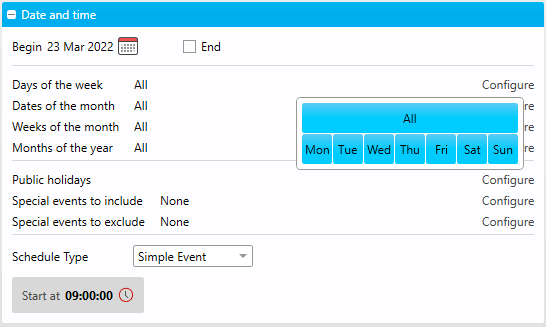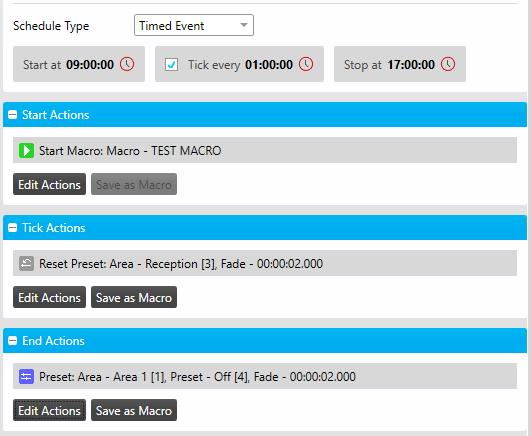Automate Tasks With Schedules
Schedules are a powerful automation tool to handle any recurring task that can be performed by actions or macros.
Schedules can repeat at specific times (absolute or relative to sunrise/sunset), days of the week, weeks of the month, and/or months of the year, and they can even include or exclude public holidays and special events.
Adjust system behavior during business/after-hours, turn the lights off for holidays and closures, regularly test emergency lighting groups, get up-to-date performance reports delivered straight to your inbox, and anything else you can think of, all without lifting a finger.
Between the huge range of available functions and granular timing control, schedules provide endless opportunities to reduce workloads, lower costs, streamline operations, and save energy.
Managing Schedules
Use the buttons at the bottom of the screen to:
-
Create a
-
the currently selected schedule(s).
-
Create a .
-
the currently selected schedule(s) or folder(s).
|
Click and drag schedules (and subfolders) between folders to keep them organised. New schedules and folders are created inside the currently selected folder (or in the same folder as the currently selected schedule), but you can easily move them to another location if required. |
|
Single-click a schedule to select it. Double-click a schedule to view it on the Schedule Overview page. |
Configuring Schedule Properties
With a schedule selected:
-
Enter a Name for easy identification.
-
Select Enabled to activate the schedule once saved, or deselect it to leave the schedule disabled.
-
Disable until the beginning of is deprecated, please leave it unchecked.

-
-
Click Begin >
 to select the desired start date for the schedule.
to select the desired start date for the schedule.-
If required, select End to set a termination date, or leave it unchecked for the schedule to run indefinitely.
-
-
For Days of the week, Dates of the month, Weeks of the month, and Months of the year:
-
Leave set to All, or click Configure to limit when the schedule will run.
 Scheduling Conflicts
Scheduling ConflictsA schedule must satisfy ALL day/date/week/month conditional logic in order to run, so take care to avoid conflicts like the example below. This schedule will never run, because these conditions cannot be true at the same time:

If you need this schedule to run when either condition is true:
-
First, save the schedule with the Dates of the month only.
-
the schedule.
-
Configure the duplicate with the Weeks of the month only.
-
These two identical schedules will now run independently of each other without interference.
-
-
-
Click Public holidays > Configure and select Include All to run on public holidays, or Exclude all if the schedule should not run on public holidays.
-
Click Special events to include/exclude > Configure to specify which special events the schedule should or shouldn’t run on.
 Creating Special Events
Creating Special Events-
Open the Edit Special Events dialog by clicking Special events to include/exclude > Configure > Edit.
-
, , and name events, and configure their start and end dates.
-
When finished, click to return.
Included/excluded public holidays and special events override any day/date/week/month conditions:
-
Schedules WILL run on included days and WILL NOT run on excluded days, regardless of any other settings.
-
Non-included/excluded holidays and events are ignored, and the schedule will follow its normal conditional logic.
-
-
Select the Schedule Type and configure its time(s):
-
A Simple Event runs the Start Actions at the Start time.
-
A Timed Event includes an additional set of End Actions to run at the End time.
-
If Tick Every xx:xx:xx is checked, the schedule also repeats a set of Tick Actions at the specified interval between the the Start and End times.
-
-
-
Depending on the schedule type, configure the Start/Tick/End Actions as required.

-
By default, System Manager runs schedules from the server, or you can select Deploy to Ethernet Gateway to run the schedule from any PDDEG-S or PDEG on the system. Gateways run schedules without consuming any server resources, and will run even if the server is offline. If deploying a schedule to an area with multiple gateways, choose one from the Deployment Status list.

If you have System Manager, it should be used for all schedule creation and management. Schedule information flows in one direction only - from System Manager to the gateways. Schedule modifications via a gateway’s web interface are ignored by SM, and may be overwritten by accident. Emergency test schedules cannot be deployed to an Ethernet Gateway, as System Manager must poll the results and save them to the database. -
When all changes to the schedule are complete, click .